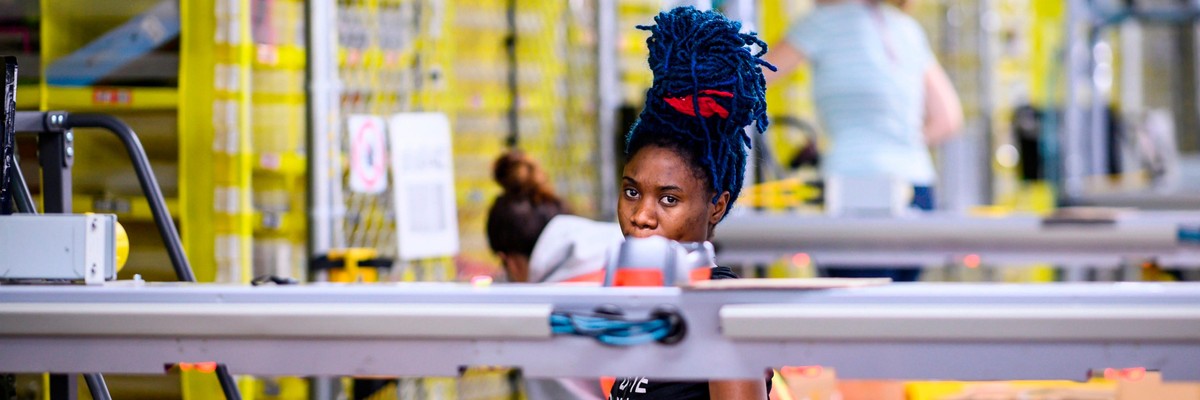
A woman works at a distribution station at the 855,000-square-foot Amazon fulfillment center in Staten Island on February 5, 2019. (Photo: Johannes Eisele/AFP via Getty Images)
To donate by check, phone, or other method, see our More Ways to Give page.

A woman works at a distribution station at the 855,000-square-foot Amazon fulfillment center in Staten Island on February 5, 2019. (Photo: Johannes Eisele/AFP via Getty Images)
"A.B. 701 is how we start winning our power and safety back."
--Athena
\u201cThe historic #AB701 victory over Amazon in California led by Athena coalition leaders @wwunited @LAANE and @LALabor to #ProtectAmazonWorkers!\n\nStory by @alinaselyukh\n\nhttps://t.co/WIcthCUWcM\u201d— Athena Coalition (@Athena Coalition) 1631220969
Trump and Musk are on an unconstitutional rampage, aiming for virtually every corner of the federal government. These two right-wing billionaires are targeting nurses, scientists, teachers, daycare providers, judges, veterans, air traffic controllers, and nuclear safety inspectors. No one is safe. The food stamps program, Social Security, Medicare, and Medicaid are next. It’s an unprecedented disaster and a five-alarm fire, but there will be a reckoning. The people did not vote for this. The American people do not want this dystopian hellscape that hides behind claims of “efficiency.” Still, in reality, it is all a giveaway to corporate interests and the libertarian dreams of far-right oligarchs like Musk. Common Dreams is playing a vital role by reporting day and night on this orgy of corruption and greed, as well as what everyday people can do to organize and fight back. As a people-powered nonprofit news outlet, we cover issues the corporate media never will, but we can only continue with our readers’ support. |
"A.B. 701 is how we start winning our power and safety back."
--Athena
\u201cThe historic #AB701 victory over Amazon in California led by Athena coalition leaders @wwunited @LAANE and @LALabor to #ProtectAmazonWorkers!\n\nStory by @alinaselyukh\n\nhttps://t.co/WIcthCUWcM\u201d— Athena Coalition (@Athena Coalition) 1631220969
"A.B. 701 is how we start winning our power and safety back."
--Athena
\u201cThe historic #AB701 victory over Amazon in California led by Athena coalition leaders @wwunited @LAANE and @LALabor to #ProtectAmazonWorkers!\n\nStory by @alinaselyukh\n\nhttps://t.co/WIcthCUWcM\u201d— Athena Coalition (@Athena Coalition) 1631220969